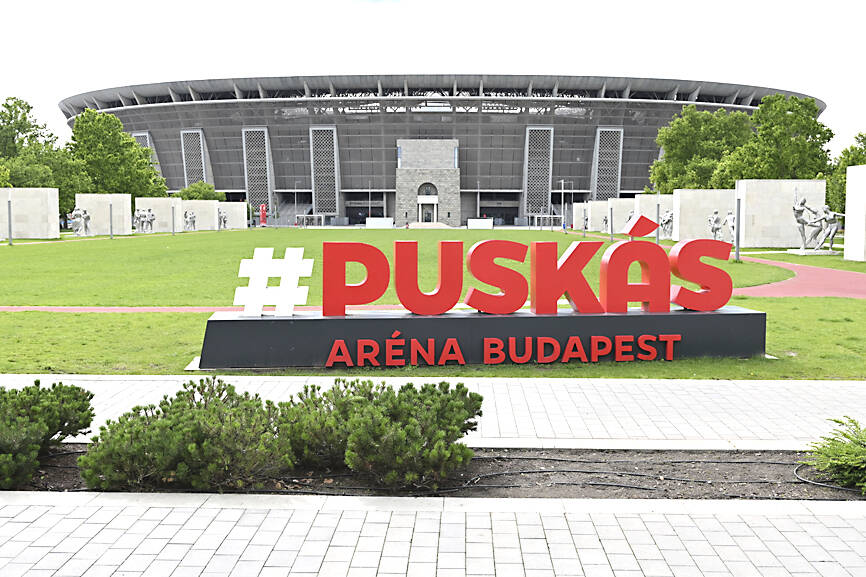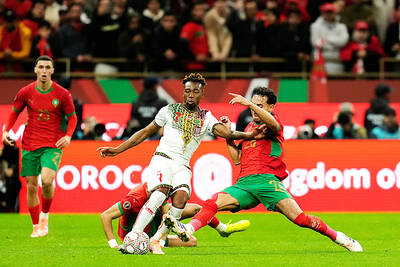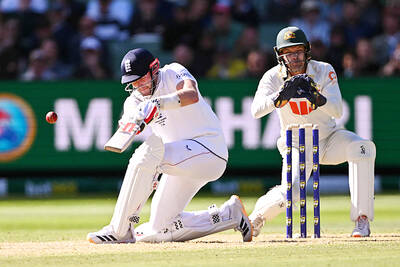Since the start of the Israel-Hamas war in October last year, many home fixtures of Israel’s national soccer team and clubs have been moved to Hungary.
It is quite a coup for Hungarian Prime Minister Viktor Orban, whose passion for sports, especially soccer, provides a counter to his relative isolation within the EU.
And as anti-Israeli sentiment and reported anti-Semitic acts surge globally — amid Israel’s war against Iran-backed Islamist militants in Lebanon and Gaza — the central European country has also provided the venue for their away games.

Photo: AP
Last night, the UEFA Europa League clash between Turkish club Besiktas and Israeli club Maccabi Tel Aviv was played in the eastern Hungarian city of Debrecen, which already hosted a Belgium-Israel UEFA Nations League match in September.
“This is Hungarian soft power at work,” said Simon Chadwick, professor of sport and geopolitical economy at France’s SKEMA Business School.
“Orban is using football for political purposes… accentuating some of the more positive credentials of himself and Hungary,” he added.
Hungarian authorities are careful to avoid incidents.
The Besiktas-Maccabi Tel Aviv fixture was to be held behind doors in Debrecen instead of the more multicultural Budapest, where Israel beat Belgium 1-0 in another Nations League game last week.
Following the outbreak of the Gaza war, Orban banned pro-Palestinian protests and regularly said Hungary is “the safest country in Europe for the Jewish community.”
His government leveraged high-profile anti-Semitic acts in Western countries as fodder to vindicate its anti-immigration stance, including the attacks on Maccabi Tel Aviv fans in Amsterdam earlier this month — condemned by Dutch and Israeli authorities as anti-Semitic.
In places “where immigration has not been stopped… they cannot stop anti-Semitism,” Orban’s chief of staff Gergely Gulyas said on the disturbances.
“Israelis are taught to be cautious” because of such incidents in Western Europe and “do see Hungary differently from the more liberal democracies,” said Gayil Talshir, a political scientist at the Hebrew University in Jerusalem.
However, she warned against idealizing Hungary, which has problems with more traditional forms of anti-Semitism, not linked to the Palestinian cause.
“Authoritarian leaders like Orban like to build on inherent anti-Semitic and racist tendencies in their societies to keep power,” she said.
“It’s dangerous for Jews,” but Israeli Prime Minister Benjamin Netanyahu “ignores it” because he is more interested in cooperating with Orban as a fellow “conservative-populist” leader, she added.
The Hungarian prime minister has repeatedly been accused of veering into anti-Semitism as his government has run poster campaigns vilifying Hungary-born Jewish financier George Soros and his son Alex.
In 2017, Israel’s then-ambassador denounced one such drive saying it “sows hatred and fear,” but the Netanyahu-led government quickly issued a statement backing Budapest’s anti-Soros campaign.
The two leader’s closeness is reflected by an invitation Orban extended to his Israeli counterpart last week to defy an arrest warrant issued by the International Criminal Court.
Hungary has long been punching above its weight in global sports.
“Going back to the communist period,” the nation of 9.6 million people was an “important center of sports power,” Chadwick said.
However, during the democratic change in the 1990s, “sport somehow got lost to a certain extent.”
“Orban is revisiting past glories and drawing from the country’s sports heritage to make Hungary great again, so to speak,” he added.
“He has the vision and strategic intent for sports that [the rest of] Europe lacks,” Chadwick said.
Since the Hungarian prime minister returned to power in 2010, the country has organized multiple high-profile international sporting events including the World Athletics Championships last year.
During the UEFA Euro 2020, Budapest’s Puskas Arena was the only tournament venue without a spectator limit and the stadium is to host the UEFA Champions League final in 2026.
Meanwhile, World Aquatics and the International Canoe Federation have both recently decided to move their headquarters from the Swiss city of Lausanne to the Hungarian capital.
Still, Orban’s ambitious dream of hosting the Olympics remains unfulfilled.
Budapest applied to host this year’s games, but withdrew its candidacy in 2017 after activists collected enough signatures to force a referendum on the issue.
The Hungarian prime minister has publicly said his government would back another bid “1000 percent” if the capital’s leadership supports it.

Backup quarterback Luke Weaver on Wednesday night threw a 22-yard touchdown pass to Nick Cenacle with 10 seconds left, as the University of Hawaii rallied for a 35-31 comeback victory over the University of California, Berkeley in a thrilling Hawaii Bowl. Weaver entered the game after Micah Alejado took a hard hit on the previous play. With the Rainbow Warriors (9-4) in range for a tying field goal, coach Timmy Chang took a shot at the end zone, and Cenacle got between two defensive backs and made the contested catch. “How amazing is that?” Chang said. “It’s a program that is built

Hosts Morocco on Friday were held to a 1-1 draw by Mali at the Africa Cup of Nations, ending their world record run of wins and leaving them still to make sure of progress to the next stage. Midfielder Brahim Diaz tucked away a penalty in stoppage-time at the end of the first half, but Mali equalized from the spot midway through the second half through Lassine Sinayoko. Both penalties were awarded after video reviews in a tempestuous clash at the end of a busy day of action at the tournament. Morocco were atop the Group A standings with four points, while Zambia,

STILL IN THE HUNT: Rasmus Hojlund took his goal tally for SSC Napoli to nine as the champions cruised to a win at US Cremonese and stayed two points behind the leaders Inter on Sunday stayed at the Serie A summit after beating Atalanta BC 1-0 to maintain their slender lead over local rivals AC Milan. Lautaro Martinez netted the only goal of the game in Bergamo for Inter, who lead Milan, 3-0 winners against Hellas Verona thanks to Christoper Nkunku’s first Serie A goals, by a single point at the top of the division. The Argentina striker has scored in four consecutive league matches to end what has been a tricky year in positive style. “I ended last season in a lot of pain... I kept going during the Club World Cup and international

An astounding 20 wickets fell on a frantic first day of the fourth Ashes Test yesterday, with Australia all out for 152 before storming back to dismiss England for 110 and leave the clash on a knife-edge. England skipper Ben Stokes won a key toss on a green track and his quicks feasted after sending in the hosts under overcast skies in front of 94,199 fans at the Melbourne Cricket Ground. It was the biggest cricket crowd ever at the cavernous arena, exceeding the 93,013 who watched the 2015 World Cup final, and they witnessed the home side collapse with Josh Tongue